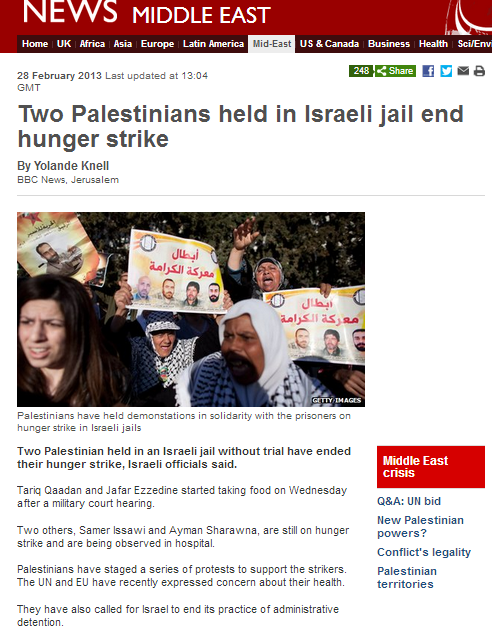On February 28th 2013 an article entitled “Two Palestinians held in Israeli jail end hunger strike” by the BBC Jerusalem Bureau’s Yolande Knell appeared on the Middle East page of the BBC News website.
As has been the case with all the BBC’s reporting on the subject of these hunger strikes and the associated riots, this article too avoids informing BBC audiences of the terror connections of the Palestinian prisoners involved in the campaign.
Writing about the two men who have ended their hunger strike, Knell informs her readers:
“Two Palestinian held in an Israeli jail without trial have ended their hunger strike, Israeli officials said.
Tariq Qaadan and Jafar Ezzedine started taking food on Wednesday after a military court hearing.”
And:
“Mr Qaadan and Mr Ezzedin are under administrative detention orders that run until 21 May. Both began a hunger strike in November taking in only water and refusing food supplements. They were transferred to a hospital earlier this month.
Another hearing for their case is expected at Ofer military court on 6 March but their lawyer says they have been told their detention will not be extended further.”
Knell conceals from her readers the fact that the two men – both from Arabe near Jenin – are senior members of the Palestinian Islamic Jihad terror organization and in doing so, compromises the BBC’s commitment to accuracy. On the subject of the other two hunger strikers, Knell writes:

“Two others, Samer Issawi and Ayman Sharawna, are still on hunger strike and are being observed in hospital.”
And:
“The men were released in October 2011 as part of a prisoner exchange deal that led to the freeing by Hamas of captured Israeli soldier Gilad Shalit. Both were later re-arrested by the Israeli authorities for allegedly violating the terms of their release. Israel has ordered they should serve out the remainder of their original sentences.
This prompted Mr Issawi to begin his hunger strike in August, but the BBC understands that at points he has broken off his protest for short periods. Mr Sharawna has been on hunger strike since July, except for a brief break in January.”
Yet again, Knell fails to inform readers of the terrorist activity which caused the DFLP associated Issawi and the Hamas member Sharawna to be imprisoned in the first place, as has been previously detailed on these pages.
“According to the Israel Prison Service, Samer Issawi of Issawiyeh, Jerusalem was arrested in April 2002 and sentenced to 26 years for attempted murder, belonging to an unrecognized (terror) organization, military training, and possession of weapons, arms and explosive materials.”
“It is important to point out the grave terrorism offences of which Al-Issawi was convicted, including firing a gun at a civilian vehicle in October 2001, indiscriminately firing an AK47 assault rifle at civilian buses, and manufacturing and distributing pipe bombs used in attacks on Israeli civilians.”
“Ayman Sharawna, from Dura near Hebron, was also released under the Shalit deal in October 2011, by which time he had served ten years of a 38 year sentence for attempted murder and bomb-making. Sharawna is a member of the Hebron branch of Hamas and was rearrested on January 31st 2012 due to violating of the terms of his release by returning to Hamas activities. Shawarna was originally apprehended on May 10th 2002 when he and another terrorist planted an explosive device near a branch of Bank HaPoalim on HaAtzmaout Street in Be’er Sheva. The device malfunctioned, but despite that eighteen people were injured in the attack. Sharawna and his accomplice were caught fleeing the scene by members of the public and he was also found to have taken part in prior shooting attacks during the second Intifada.”
The recurrent failure of the BBC to fully disclose the associations and actions of these prisoners cannot be excused as a mere oversight. Rather, this is a clear attempt to shape audience perception of events by placing the accent of the story upon the subject of their imprisonment, whilst downplaying their terror connections to the point of non-existence. That practice is rendered even more egregious by Knell’s observation later in the article that:
“There have been widespread demonstrations in the West Bank and Gaza Strip in recent weeks to show support for Palestinian prisoners who are widely seen as heroes of the national cause.” [emphasis added]
Neither Knell nor any of her colleagues who have written about this subject have bothered – even in the name of token impartiality – to report how Israelis see convicted attempted murderers and members of terrorist organisations. Neither has a full and factual profile of the practice of Administrative Detention been provided for BBC audiences’ information and understanding, nor any column space whatsoever been devoted to the Israeli view of why it is necessary.
In fact, the BBC’s reporting across the board on this subject seems to suggest that it has decided to join in with the PA’s portrayal of Palestinian prisoners as wronged tragic heroes and with its public campaign against the detention of terror operatives which includes the attempt to redefine them as ‘political prisoners’. That impression is only reinforced by Knell’s choice of quote towards the end of the article.
“On Wednesday, a UN human rights investigator called for an international inquiry into Mr Jaradat’s death.
“The death of a prisoner during interrogation is always a cause for concern, but in this case, when Israel has shown a pattern and practice of prisoner abuse, the need for outside credible investigation is more urgent than ever,” stated Richard Falk, UN special rapporteur for human rights in the Palestinian territories.”
The highly discredited Richard Falk was recently removed from a concurrent post at Human Rights Watch on account of a long history of anti-Israeli bias, 9/11 conspiracies and often overt antisemitism. Falk – who predictably repeats and promotes the Palestinian Authority’s entirely unproven accusation that Arafat Jaradat died “during interrogation” in an Israeli prison in this quote – would of course have been highly unlikely to say anything else, but the use of that quote allows Knell to garnish her article with what she apparently assumes to be an air of UN-related supposed authority.
Knell’s failure to adhere to BBC editorial guidelines on accuracy and impartiality means that her article joins its predecessors on the subject as yet another example of political campaigning badly disguised as journalism.




